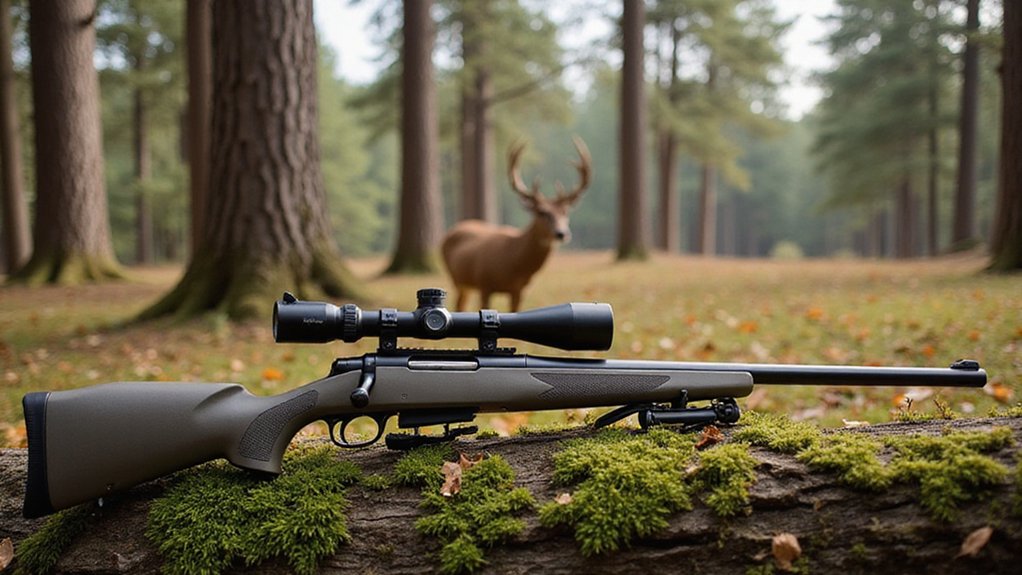Rifle hunting can be a rewarding way to connect with nature and develop your skills. It’s not just about the thrill; it requires focus, patience, and strategy. Before you head out, you’ll need to understand the essentials, from choosing the right rifle to knowing the best hunting locations. Curious about how to get started and what to contemplate? There’s much more to explore that can enhance your experience.
What is Rifle Hunting and Why is it Popular Among Beginners?
Rifle hunting is an exciting outdoor activity that combines skill, patience, and a deep connection with nature. It’s popular among beginners because it offers a unique blend of challenge and reward.
As a beginner, you’ll appreciate the focus on marksmanship and strategy, which can enhance your confidence. Additionally, rifle hunting allows you to engage with wildlife in a way few other activities do.
The thrill of tracking and the satisfaction of a successful hunt can be incredibly fulfilling. Plus, it fosters camaraderie among fellow hunters, creating lasting friendships and shared experiences that make it even more appealing to newcomers.
How to Choose the Right Rifle for Hunting
Choosing the right rifle can greatly enhance your hunting experience and guarantee that you’re well-prepared for the challenges ahead. Here’s what you should consider:
- Caliber: Select a caliber suitable for the game you’re hunting.
- Weight: A lightweight rifle is easier to carry over long distances.
- Action type: Decide between bolt-action, semi-automatic, or lever-action based on your preference.
- Fit: Confirm the rifle fits you well; it should be comfortable to hold and shoot.
- Budget: Set a budget that balances quality with affordability.
With these factors in mind, you’ll be ready to make an informed choice.
What Gear Do You Need for Successful Rifle Hunting?
When preparing for a successful rifle hunting trip, having the right gear can make all the difference.
You’ll need a reliable rifle, appropriate ammunition, and a sturdy scope for accuracy. Don’t forget a comfortable sling to carry your rifle easily.
Wear weather-appropriate clothing, including layers and waterproof gear if necessary. A good pair of binoculars helps you spot game from a distance.
Additionally, bring a first aid kit, a knife for field dressing, and a backpack to carry your essentials.
Finally, having a map or GPS will keep you oriented and guarantee a smooth hunting experience.
How to Practice Safe Rifle Handling and Shooting Techniques
Equipping yourself with the right gear is just the first step in your rifle hunting journey; mastering safe handling and shooting techniques is equally important.
Here are some key points to keep in mind:
- Always treat your rifle as if it’s loaded.
- Keep the muzzle pointed in a safe direction.
- Use the safety mechanism until you’re ready to shoot.
- Be aware of your target and what lies beyond it.
- Practice regularly to improve your accuracy and confidence.
What are the Best Tips for Selecting Hunting Locations?
Where can you find the best hunting spots? Start by scouting local wildlife areas, national forests, and state parks.
Look for signs of animal activity, like tracks or droppings, which indicate good locations. Pay attention to food sources, water availability, and cover, as these attract game.
Consult local hunters or online forums for tips on specific areas. Timing is essential; hunt during early mornings or late afternoons when animals are most active.
Finally, check the regulations regarding hunting zones to guarantee you’re in a legal area. Choosing the right location can make all the difference in your success!
How Can Beginners Improve Their Accuracy When Rifle Hunting?
Improving your accuracy when rifle hunting is essential for both ethical hunting and a successful outing.
To enhance your shooting skills, consider these key practices:
- Practice regularly at the range to build muscle memory.
- Adjust your rifle’s scope for ideal sight alignment.
- Use proper shooting positions and techniques for stability.
- Focus on your breathing and trigger control before pulling the trigger.
- Review your shots and learn from any missed opportunities.
What Should You Know About Hunting Regulations and Licenses?
Before you head out into the field, it’s important to understand the hunting regulations and licensing requirements in your area. Each state has specific rules regarding hunting seasons, bag limits, and the types of game you can hunt.
Make sure you acquire the necessary licenses before your trip; hunting without one can lead to hefty fines. Additionally, familiarize yourself with local laws about hunting methods and safety protocols.
It’s a good idea to check for any changes in regulations annually, as they can vary from year to year. Staying informed guarantees a safe and legal hunting experience.
How to Clean and Maintain Your Rifle After Hunting Trips
While you might be keen to relive your hunting experience, taking the time to clean and maintain your rifle is essential for its longevity and performance.
After each trip, follow these steps:
- Disassemble the rifle according to the manufacturer’s instructions.
- Use a cleaning rod and patches to clean the barrel.
- Wipe down all metal surfaces with a suitable oil to prevent rust.
- Clean the stock with a gentle wood cleaner if needed.
- Inspect all components for wear or damage before reassembling.
This routine keeps your rifle in top shape, ensuring reliability for your next hunting adventure.
